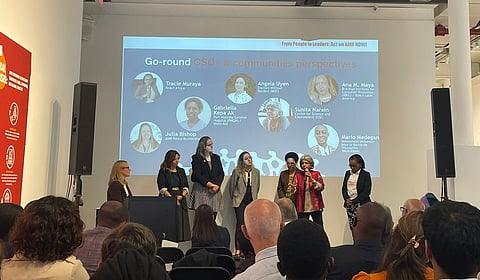

ReAct, along with other civil society groups, co-organised a side event titled From People to Leaders on September 24, ahead of the upcoming high-level meeting on Antimicrobial Resistance (AMR) at United Nations General Assembly (UNGA) 2024. The Centre for Science and Environment (CSE) was one of the co-organisers, and Sunita Narain, CSE director general, also spoke at this event.
The event aimed to amplify the voices of communities and civil society, emphasising the need to present their concerns at the UNGA high-level meeting, where a global political declaration on AMR is expected to be adopted.
From People to Leaders brought together key stakeholders and experts from around the globe for a unified call to action with time-bound commitments on AMR. Experts shared their insights on antibiotic resistance, with focus on low- and middle-income countries (LMICs) and perspectives on the way forward. The areas of discussion included access to antibiotics, control of antibiotic misuse, prevention, political commitment, accountability, implementation and financing of national action plans, and a unified One Health approach.
AMR is a growing silent pandemic and has become one of the most significant public health threats today. The overuse and misuse of antibiotics in humans and animals are fueling the rise of resistant bacteria, rendering many antibiotics ineffective. According to recent estimates, antibiotic-resistant bacterial infections could take the lives of more than 39 million people by 2050.
Sunita Narain raised concerns about antibiotic use and AMR in food-producing animals, and agriculture, and its impact on the environment. She emphasised the need for a prevention-based system, as developing nations cannot afford an industrial farming system where we first pollute and then clean up. “The access to antibiotics, and reduction of misuse of antibiotics agenda must go hand in hand, and for that, affordability is critical,” she said.
Narain also spoke about the conservation of antibiotics, and focusing on preventive measures being key to reducing antibiotic misuse in the food-animal production sector. There are examples from India where homemade traditional medicines have brought down antibiotic misuse in Indian dairy sector, reduced the cost of farmers, and improved housekeeping, Narain mentioned.
She also stressed on the dropped-out agenda of intensive industrial food farming systems to reduce the use of antibiotics in food-producing animals. These systems resist controls and target their sales, instead of focusing on reducing antibiotic use in the global food system.
Representatives from global community and civil society groups shared their concerns and experiences, highlighting the real-world impact of AMR. The experts emphasised the need for political commitments to ensure the fulfilment of promises, holding high-level meetings with LMICs, financial access, prevention policies, promotion of human and animal welfare, and evolving the World AMR Awareness Week into World Antimicrobial Action Week.
Otto Cars, founder of the ReAct Network, concluded that while much progress has been made, there is still more to do at this pace. He emphasised that national action plans cannot be solely government programs; they should involve a unified approach to tackling AMR, including professionals from various sectors to help implement the plan. A One Health response to AMR requires political, financial, and technical engagement, with governments ensuring the timely delivery of recommendations.